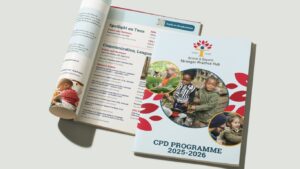
Millie Colwey leads an outdoor early years setting in Bristol. Millie has years of experience working as a childminder, outdoor educator and engaging with systems leadership beyond her own settings. She is currently doing postgraduate research into early childhood education for sustainability.
Sowing Seeds for the Future: Education for Sustainability for Childminders and Early Years Settings by Millie Colwey
This blog explores the importance of education for sustainability, practical steps you can take, and how our sector can lead the way to creating a greener, safer future for young children. As the impacts of climate change become increasingly visible, the work of building sustainable futures for the youngest generations has never been more urgent. Early years settings play a pivotal role in fostering environmental responsibility and sustainable behaviours in children. Childminders are particularly well placed to do pioneering work in the sector because of the pedagogical freedom with which they practice. With the Department for Education’s (DfE) Sustainability and Climate Change strategy, it is essential to consider how unique settings might rise to the challenge.
Why Education for Sustainability Matters in Early Years
Values and habits developed in childhood can shape a person’s behaviours for life. Education for sustainability is about much more than teaching children about recycling! It is a broad approach to education that fosters critical thinking about how humans live. It takes a holistic view of sustainability, including socio-cultural, financial and environmental dimensions, with a strong connection to social justice. Early years practitioners are well placed to begin shaping children’s dispositions, values and habits. Childminders, in particular, have a great deal of autonomy in how they choose to practice and are uniquely placed to make sustainability an integral part of their curriculum.
The DfE’s Sustainability and Climate Change Strategy
This sets out the expectation that all education settings should have a designated sustainability lead and climate action plan. For childminders working alone or in small teams, this might seem daunting at first glance. However, these requirements are not about adding burdensome tasks to already busy schedules. Instead, they represent an opportunity to enhance existing practices, benefit children’s development, and contribute to the global effort to address climate change.
Being a sustainability lead doesn’t require any special qualifications or training. Rather, it means identifying someone on the team who feels particularly motivated by the issues and is willing to lead their colleagues in working towards climate actions as part of teaching and learning, as well as management of the setting.
Embedding Sustainability in Everyday Practice
Working towards sustainability is about making small, meaningful changes that can have a lasting impact. It does not require a big budget! Here are some practical ways you might promote sustainability in your work with babies, toddlers and young children:
- Outdoor play and learning: Take advantage of outdoor spaces. Visiting places where children will encounter wildlife, such as plants, insects, and birds, is particularly beneficial. You will encounter wildlife even in the most built-up urban areas. For example, introducing a weekly walk around your community might present opportunities to observe dandelion flowers growing out of the cracks in pavements and changing over time, snails and woodlice living in the gaps between bricks or swifts soaring high over tower blocks. This presents important opportunities to develop children’s understanding of the world (see EYFS Development Matters, pages 99-133, which are about Understanding the World, for more information).
- Sustainable food practices: Even the smallest settings can help children to learn about food growing by sowing crops like radishes or carrots in containers, or growing herbs in pots. By being involved in all parts of the growing process – from seed to plate – children can find out about seasonal eating, saving water, and turning waste into compost to fuel growth. Sustainable habits are closely linked with children’s healthy outcomes (see EYFS Development matters, pages 42-73, which are about Personal, Social and Emotional Development and Physical Development, for more information). Furthermore, food growing presents a truly holistic learning event that can easily be linked with maths, literacy and communication and language development (see the Education Endowment Foundation’s Early Years Evidence Store for evidence-informed teaching strategies). You could extend this work by considering the meals you provide or supporting parents to reduce single-use plastics in packed lunches.
- Consider your environment: In your climate action plan, you should consider how you will take small steps in the right direction when it comes to your building, resources and where your setting spends money. For example, the Southwest region has a number of ‘scrap stores’ where you can obtain scrap for art activities and loose parts play. Childminders have a great deal of autonomy over how they run their settings and can easily take actions that have a big impact, like choosing to use an ethical bank.
- Lead by example: Babies, toddlers and young children often pay close attention to what adults do. Their observation of us is a key learning strategy that we should be aware of. As part of your teaching, you can model and explain your everyday sustainable choices. For example, “I only need one paper towel to dry my hands, so I’ll put this one back in the pile,” or, “The sun is so bright today, I can switch off the lights to save energy.”
Importantly, this teaching and practice should be done without children hearing frightening messages about the decline of nature and climate breakdown. The goal is for young children to have a sense of agency so they learn to view themselves as people who can create change. For example, do tell children that you are planting wildflowers to increase biodiversity in your garden and why this is healthy; but don’t tell children that leaving lights on will make polar bears die! Through early childhood, children can learn about sustainability in a positive and hopeful way.
Creating a Climate Action Plan
Developing a climate action plan might sound daunting, but it’s a manageable and rewarding process. Larger teams might find it useful to have a written document to keep everyone on track and hold one another to account. Develop something relevant and valuable to your setting, and keep it simple, as in this example.

However, there is no need to have it as a written plan! At the time of writing, it is not something that is coming up during Ofsted inspections and there is no requirement to submit the climate action to plan the local authority. So, do what works for your setting.
Overcoming Challenges and Making Sustainability… Sustainable!
Every setting will have different starting points on its climate action journey. The important thing is to make a start and keep building on it at a manageable pace so that your setting can sustain changes over time.
Some settings may face unique challenges. For example, childminders may have limited resources and budgets compared to larger settings, and ‘packaway’ settings may not be able to establish food-growing areas. However, these challenges can often be reframed as opportunities to be creative and innovative in your work.
For example, a small indoor space could still grow a windowsill garden. Limited budgets can encourage upcycling and making use of free or low-cost resources from nature. And when time is tight, integrating sustainability and climate education into well-established routines like story or snack time can make it more manageable.
Grassroots Action for Wider Change
Education for sustainability benefits children, families and communities. Children gain a deeper understanding of their world, develop critical thinking skills, and build resilience. Inspired by their children’s engagement, families often adopt sustainable practices at home. A key dimension of sustainability is socio-cultural sustainability. You should view any work you do to build strong communities – such as hosting community events, connecting with local residents, and looking after your local environment – as being part of your sustainability work. Small acts in local contexts add up to create huge waves of positive change in our society.
Conclusion
The journey towards sustainability in early years settings is a collaborative and evolving process. For childminders and early years practitioners, it presents an opportunity to lead by example, show what is possible and inspire others. As the DfE’s ambitious Sustainability and Climate Change strategy takes prominence in our work, let’s embrace this challenge with the creativity and optimism our sector has long been known for. By sowing the seeds of sustainability now, we can nurture a brighter future for the young children we work with and the entire living world.
View TicketsJoin Millie's Sustainability Sessions
Reference, Further Reading and Resources
Action for Climate Collection – Some specific sessions for early years in May 2025
The 17 Goals – Sustainable Development
Early Years Sustainable Hub (ENSFC)
Understanding Sustainability in Early Childhood Education (Case Study)
Sustainability and climate change strategy (GOV.UK)
Sustainability leadership and climate action plans in education (GOV.UK)
Climate Ambassadors: Turning Climate Ambition into Climate Action in Education (Climate Ambassadors)



